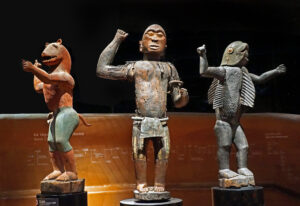Cambodia’s cultural heritage has long been a target for looters and traffickers. In the aftermath of conflict and colonization, countless sacred sites and national treasures were stripped bare—sold to the highest bidder and often smuggled out of the country under a veil of secrecy.
A powerful new documentary, Loot: A Story of Crime & Redemption, by filmmaker Don Millar, dives into these crimes and the decades-long effort to bring looted Cambodian antiquities home. The film follows the emotional and political fight for justice, documenting how looters, collectors, and complicit institutions contributed to the theft of a nation’s soul—and how the tide is finally beginning to turn.
In a recent episode of The Diplomat’s “Beyond the Mekong” podcast, Millar speaks about the making of Loot, and the remarkable individuals whose persistence helped drive this movement. Among them is Tess Davis, Executive Director of the Antiquities Coalition, who Millar praises for her unwavering determination.
“Tess Davis from the Antiquities Coalition just won’t give up,” he says. “You see a few individuals like Tess… won’t give up, and you can actually get a result.”
Tess Davis has spent nearly two decades working to expose the illicit trade in antiquities, particularly in Southeast Asia. She has played a central role in investigations, legal actions, and public advocacy that have led to historic repatriations from prominent collectors and museums to Cambodia.
Her work continues to inspire global efforts to hold traffickers accountable, repatriate stolen cultural heritage, and ensure that future generations can reclaim their past.
Listen to the “Beyond the Mekong” podcast here.
Learn more about Douglas Latchford’s criminal network here.








